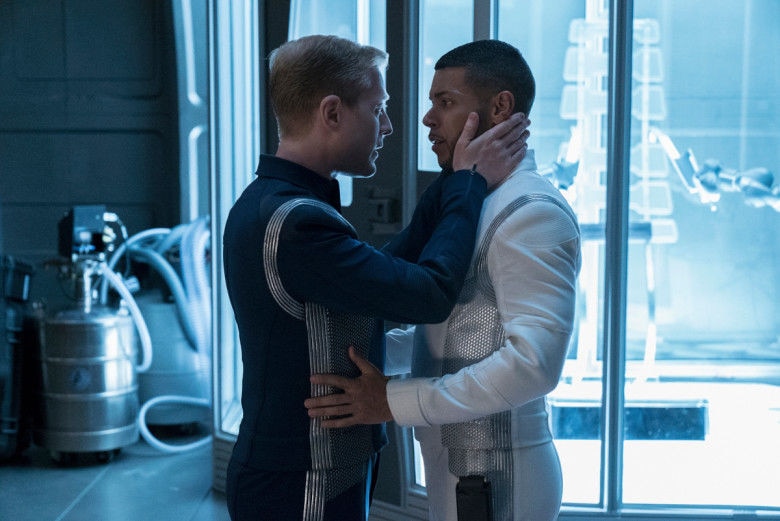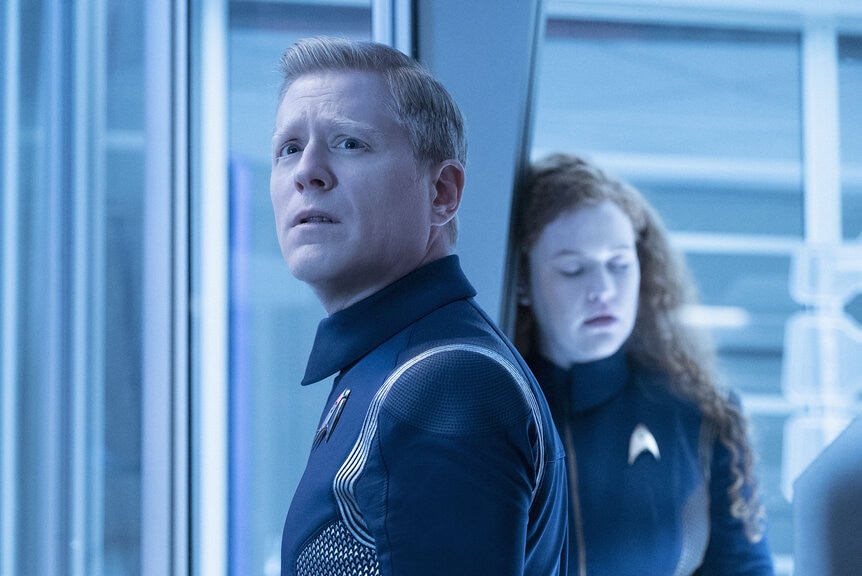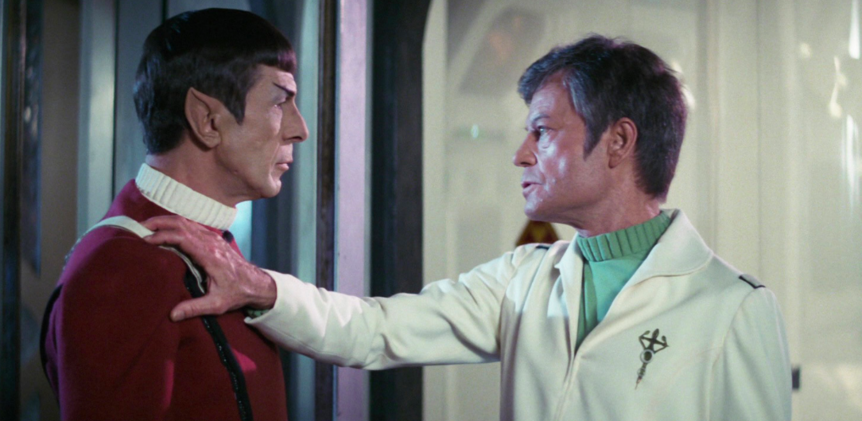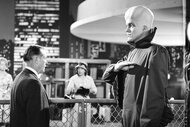Create a free profile to get unlimited access to exclusive videos, sweepstakes, and more!
Star Trek: Discovery revives the emotional Trek tradition of sci-fi resurrection

Returning from the dead is a proud Star Trek tradition. And now, on the latest episode of Star Trek: Discovery, "Saints of Imperfection," the infinite possibilities of strange new life include, once again, defying death with a nifty sci-fi plot device. Here’s how the latest Trek resurrection connects to one famous Trek back-from-the-dead moment of the past, both in canon and the real world, too.
**SPOILER ALERT: There are spoilers below for Star Trek: Discovery Season 2, Episode 5, “Saints of Imperfection.”**
Back in 2018, Dr. Hugh Culber's (Wilson Cruz) Season 1 death was by no means the first death in Trek history, but it was perhaps the most controversial, since, well, Spock's in 1982’s The Wrath of Khan. Famously, Spock came back to life in 1984’s The Search for Spock, and regained his personality in 1986’s The Voyage Home, eventually leading him to be insulted about his resurrection by Bones in 1989’s The Final Frontier. In that film, Bones gesticulates with his flask of whiskey, points at Spock (Leonard Nimoy), and says, “I think I liked him better before he died.”
If you do die in Star Trek, nobody ever lets you live it down.
For fans who have been waiting for Dr. Culber's return since 2018, this might offer some perspective. Trek fans in 1982 had to wait two years for Spock to return, which is double the amount of time it's taken for Culber to return triumphantly back to life in the latest episode of Discovery. In this episode, Cruz’s Culber is back, and we learn he survived being murdered in “Despite Yourself” literally through the power of love. Because Stamets was still “in the network” when he held Hugh’s body in that episode, Hugh’s essence was transferred into the mycelium network and reassembled. After some sci-fi shenanigans and some fast talking from Tilly, the episode ends with Hugh Culber being 100 percent alive again, and in our universe.
Basically, bringing back Culber required a combination of alien tech, transporters, and pseudo-time travel, which makes his resurrection a perfect cocktail of various other ways Trek characters have come back to life. Spock was brought back to life thanks to the “Genesis Effect” in tandem with the Vulcan ability to transmit their souls into the body of a close friend or relative upon dying. Spock and Bones weren’t lovers in the original series (were they?), but the idea of transferring the soul of another person via physical touch and sci-fi mumbo jumbo is sweetly similar to how Stamets manages to accidentally save Hugh.
But, more interestingly, Culber’s return does share some real-life similarities with Mr. Spock's death-rebirth in the '80s. For one thing, like Nimoy before him, Cruz has had to weather some fan pressure about his character's death for basically an entire year. On the night “Despite Yourself" aired, Cruz assured fans that Culber’s death was not the end, calling the romance between Paul and Hugh an “epic love story.”
Part of the criticism about Culber’s death was concern from the LGBTQ community that killing the character represented an uncomfortable “bury your gays” trope on a series that was supposed to be about progressivism. “I understand why people are upset,” Cruz said in 2018, "I am familiar with the problematic tendencies of television shows to do away with their LGBT characters, especially people of color." Some prominent journalists were so upset about the first season’s treatment of the Stamets/Cubler storyline that they threatened to “rage quit” the entire series.
Cruz, Anthony Rapp, and the creative forces behind Star Trek: Discovery are in good company when it comes to angering fans. Back in 1982, prior to the release of Star Trek II: The Wrath of Khan, news leaked to the fanzines that Spock would die in the movie, which caused a public outcry, with many fans threatening to boycott the movie. The Wrath producer Harve Bennett and director Nicholas Meyer were both shocked to discover that the person who leaked Spock’s death was none other than Trek creator Gene Roddenberry. Apparently, Roddenberry was so appalled by the decision to kill Spock he actively tried to harm the film's publicity by trying to spoil its biggest twist ahead of time. Roddenberry biographer Joel Engel says this in the book The Fifty Year Mission: “...It’s telling that Gene Roddenberry couldn’t imagine Spock’s rebirth.”
And for fans who couldn't imagine Culber's rebirth, consider this: Just before Culber "died" in the previous season, he and Stamets share a tender moment before Stamets gets inside the Spore Drive chamber. In The Wrath, Spock and Bones share a moment before Spock gets inside the Warp Drive chamber. The roles are slightly flipped, and Bones and Spock aren't (overtly?) romantic, but visually, these cues are enough to make any smart fan feel like Discovery knows what it's referencing. The echo is clearly there. Something that happened at this moment was going to lead to Culber's rebirth, just as something happened between Spock and Bones in a similar moment leads to Spock's rebirth.
Back in the '80s, angry fans didn’t have the sheer volume of press access we have to Trek now. Yet one thing has remained constant: For some, a beloved character's death feels like an actual death, even if a fantastical resurrection is promised in the near future. It remains to be seen if history will regard Culber's return in the same positive light we think of The Wrath of Khan and The Search For Spock, but so far, in terms of the pressure on the actors and creative teams, one aspect of history has repeated itself in several specific ways with this new storyline.
In Star Trek IV: The Voyage Home, Bones tries to get Spock to talk to him about “what it was like” to die. Spock says, “I can’t discuss it without a mutual frame of reference.” Infuriated, Bones replies, “You mean I have to die to discuss your insights on death?”
But now, because Discovery takes place before the original Trek, it seems very possible a different Starfleet physician, Dr. Culber, will meet Ethan Peck’s new Spock later in this season. And hopefully, if Culber and Spock do meet, they’ll take a quick moment to have the greatest discussion in all of Star Trek: How to die in outer space and come back better than ever. Spock should listen, too, because Culber is going to have some great tips.




























